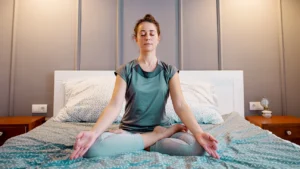In today’s busy world, worry and not being able to sleep are typical problems. Many people have trouble relaxing and getting the rest their bodies and minds need, whether it’s because of stress at work, problems at home, or bad habits in their daily lives. Luckily, nature has a lot of gentle, effective treatments that can help you relax and sleep better without the side effects of drugs.
Let’s look at the best natural ways to get better sleep and feel less stressed, so you can feel more rested, energized, and calm.
How Stress and Sleep Are Connected
There is a strong link between stress and sleep. Your body produces more cortisol, the stress hormone, when you’re worried. It keeps your brain alert and your body tense. This reaction can make it take longer to fall asleep or wake you up many times at night. However, inadequate sleep can also increase the likelihood of stress, making it challenging to break the cycle.
You can help your nervous system calm down, control the production of cortisol, and get a better night’s sleep by using natural treatments.
Herbal Teas to Help You Sleep
People have long used herbal tea as a sleep aid. There are chemicals in teas like chamomile, valerian root, lemon balm, and passionflower that calm the mind and body.
A lot of people use chamomile because it makes them feel calm. Three to four warm cups of tea before bed can help your brain understand it’s time to relax. Valerian root, which tastes a little stronger, can help calm you down and help you fall asleep quickly.
Use of Essential Oils and Aromatherapy
Another natural way to make the room feel calm and relaxing before bed is to use aromatherapy. Studies have shown that essential oils such as lavender, sandalwood, bergamot, and ylang-ylang can reduce stress and improve sleep quality.
There are several ways to use essential oils. You can put a few drops in a diffuser, spray your pillow with a diluted mix, or put them in a warm bath before bed. Especially lavender has been studied a lot for its ability to help people sleep.
Practices for Breathing and Meditation
When you’re stressed, you might breathe quickly and shallowly. Deep breathing is a great way to get ready for bed because it calms the body and mind. Diaphragmatic breathing or the 4-7-8 method (breathe in for 4 seconds, hold for 7, and breathe out for 8) can help lower your stress chemicals and heart rate.
The effect is stronger when you combine breathing with meditation. A short session of mindfulness meditation before bed can help calm your mind and get your body ready for sleep. Apps or soothing music can help newbies get through these lessons.
A relaxing routine for bedtime
What you do before bed has a big effect on how fast and deeply you sleep. To help your melatonin levels rise, stay away from screens and bright lights at least an hour before bed. Instead, do something relaxing like reading a real book, writing in a notebook, or taking a warm shower.
Going to bed and waking up at the same time every day will stabilize your body’s clock, making it easier to fall asleep.
Magnesium and health supplements
A mineral called magnesium is essential because it helps control sleep and lowers stress. It helps your muscles rest and keeps your nerve system healthy. Whole grains, nuts, seeds, and fresh veggies contain large amounts of magnesium. You can also add magnesium; it’s best to do this in the evening.
Melatonin, L-theanine (found in green tea), and GABA are some other natural products that can help you sleep. Before starting a new supplement plan, you should always talk to a medical professional.
The sun and physical activity
Spending time in natural sunlight during the day helps your circadian schedule, which controls when you sleep and wake up. Serotonin output goes up when you get enough light, especially in the morning. At night, serotonin changes into melatonin.
Being active is also important for reducing stress and getting a good night’s sleep. A 20–30 minute walk during the day can make you feel better and help you sleep better at night. But don’t do hard workouts right before bed because they might wake you up too much.
Cut down on sugar and caffeine
What you eat during the day can affect how well you sleep and how stressed you are. If you eat or drink caffeine or sugar in the afternoon or evening, it can mess up your normal sleep habits.
For stable blood sugar, switch from coffee or tea to warm milk or herbal teas in the evening and eat well-balanced meals with whole foods. During the day, this can help you feel calmer and more in control.
Nature and Techniques for Grounding
One of the best natural ways to deal with stress is to spend time in nature. You can ground your energy and calm your nervous system by walking barefoot on grass, sitting next to a tree, or just looking up at the sky.
This method, called “earthing” or “grounding,” has been shown to lower inflammation, boost happiness, and help people sleep better. Spending even a short amount of time in nature every day can make a big difference in how well you sleep and how stressed you are.
Writing down feelings and keeping a journal
If your mind runs at night, writing in a book can help you get rid of your feelings and thoughts before you go to sleep. Write down your fears or things you’re thankful for, or just say how you feel without worrying about what other people will think.
This act of letting go tells your brain it’s safe to relax and lets your mind rest. Making writing in a book a regular habit can also help you understand your feelings better and feel less anxious over time.
Last Thoughts
You don’t have to take medicine to sleep better and feel less stressed. A gentle, all-around way to help your mind and body is to use natural treatments like plant teas, essential oils, breathing exercises, and a relaxing routine.
Being consistent and patient is key. Natural ways work best when used on a daily basis. As time goes on, you’ll start to feel better overall and experience deeper and more restful sleep. Allow yourself to take it easier, spend more time in nature, and find a more tranquil way to rest.




